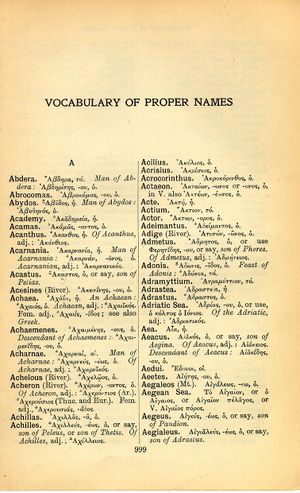Achilles: Difference between revisions
Βροτοῖς ἅπασι κατθανεῖν ὀφείλεται → Reddenda cunctis vita tamquam debitum → Den Tod erleiden schulden alle Sterblichen
(D_1) |
(Gf-D_1) |
||
| Line 1: | Line 1: | ||
{{WoodhouseENELnames | {{WoodhouseENELnames | ||
|Text=[[File:woodhouse_999.jpg|thumb|link= | |Text=[[File:woodhouse_999.jpg|thumb | ||
|link={{filepath:woodhouse_999.jpg}}]][[Ἀχιλλεύς]], -έως, ὁ, or say, <b class="b2">son of Peleus</b>, or <b class="b2">son of Thetis</b>. | |||
Of <b class="b2">Achilles</b>, adj.: [[Ἀχίλλειος]]. | Of <b class="b2">Achilles</b>, adj.: [[Ἀχίλλειος]]. | ||
| Line 8: | Line 9: | ||
}} | }} | ||
{{Gaffiot | {{Gaffiot | ||
|gf=<b>Ăchillēs</b>,⁹ is ou ī ou ĕī (acc. em ou ĕa), m., Achille [fils de Pélée et de Thétis] : Cic. Tusc. 1, 105, etc. || [fig.] un Achille : Pl. Mil. 1054 ; Virg. En. 6, 89. | |gf=<b>Ăchillēs</b>,⁹ is ou ī ou ĕī (acc. em ou ĕa), m., Achille [fils de Pélée et de Thétis] : Cic. Tusc. 1, 105, etc. || [fig.] un Achille : Pl. Mil. 1054 ; Virg. En. 6, 89.||[fig.] un Achille : Pl. Mil. 1054 ; Virg. En. 6, 89. | ||
}} | }} | ||
Revision as of 07:20, 14 August 2017
English > Greek (Woodhouse)
Ἀχιλλεύς, -έως, ὁ, or say, son of Peleus, or son of Thetis.
Of Achilles, adj.: Ἀχίλλειος.
Latin > English (Lewis & Short)
Ăchilles: is, m., = Ἀχιλλεύς (poet., after the manner of the Gr.
I Nom., Achilleus, trisyl., Inscr. Grut. 669, 6.—Gen. Achillei, quadrisyl., Hor. C. 1, 15, 34; id. Epod. 17, 14; and Achilli, as Neocli, Lacydi from Neocles, Lacydes, Plaut. Bacch. 4, 9, 14; Verg. A. 3, 87; cf. Val. Prob. 1468 P.—Acc. Achillĕa, Luc. 10, 523.—Voc. Achille, Prop. 4, 11, 40.—Abl. Achilli, Ov. Pont. 3, 3, 43), the celebrated Grecian hero in the Trojan war, distinguished for strength and beauty; son of Peleus, king of Thessaly, and of Thetis, Ov. M. 12 fin. and 13 init.; Stat. Achill. al. In the fine arts, Achilles is represented with hair long and erect, like a mane, a body straight and slender, nostrils (μυκτῆρες) distended with courage and pride, and a physical frame throughout noble and powerful, Müll. Arch. § 413.—
II As an appellative, a nandsome and powerful man, Plaut. Mil. 4, 2, 63; Verg. A. 6, 89; Gell. 2, 11.—Hence, Ăchillēus, a, um, adj., Ἀχίλλειος, of or pertaining to Achilles: stirpis Achilleae fastus, Verg. A. 3, 326: manes, Ov. M. 13, 448: statuae, statues like Achilles, Plin. 34, 5, 10: cothurnus, the lofty and grave tragic style (since Achilles was a hero of the early epos and drama): Achilleo conponere verba cothurno, Prop. 3, 32, 41 (Aeschyleo, Müller).—Also, Ăchil-lĭăcus, a, um, Ven. 7, 8, 63.
Latin > French (Gaffiot 2016)
Ăchillēs,⁹ is ou ī ou ĕī (acc. em ou ĕa), m., Achille [fils de Pélée et de Thétis] : Cic. Tusc. 1, 105, etc. || [fig.] un Achille : Pl. Mil. 1054 ; Virg. En. 6, 89.

